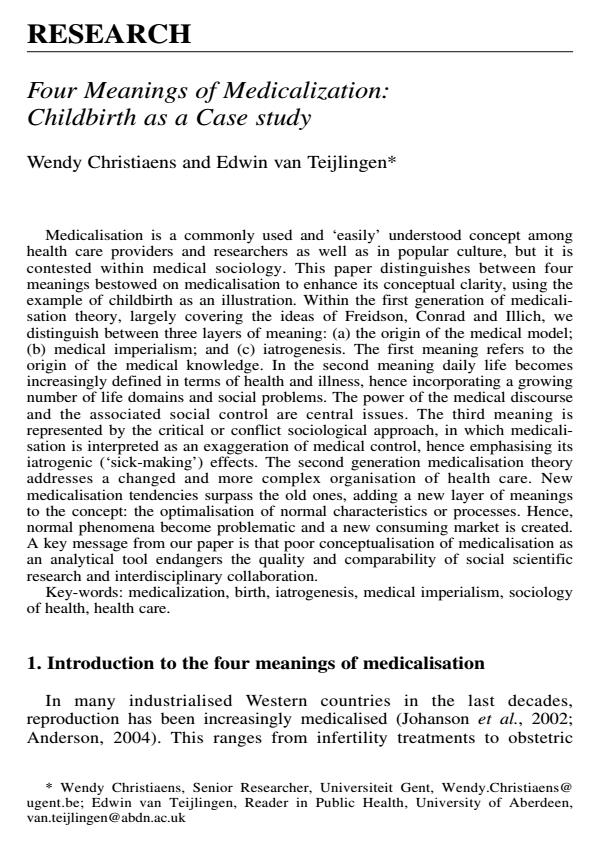Four Meanings of Medicalization: Childbirth as a Case study
Titolo Rivista SALUTE E SOCIETÀ
Autori/Curatori Wendy Christiaens, Edwin van Teijlingen
Anno di pubblicazione 2009 Fascicolo 2009/EN2
Lingua Italiano Numero pagine 19 P. 123-141 Dimensione file 98 KB
DOI 10.3280/SES2009-EN2009
Il DOI è il codice a barre della proprietà intellettuale: per saperne di più
clicca qui
Qui sotto puoi vedere in anteprima la prima pagina di questo articolo.
Se questo articolo ti interessa, lo puoi acquistare (e scaricare in formato pdf) seguendo le facili indicazioni per acquistare il download credit. Acquista Download Credits per scaricare questo Articolo in formato PDF

FrancoAngeli è membro della Publishers International Linking Association, Inc (PILA), associazione indipendente e non profit per facilitare (attraverso i servizi tecnologici implementati da CrossRef.org) l’accesso degli studiosi ai contenuti digitali nelle pubblicazioni professionali e scientifiche.
Four Meanings of Medicalization: Childbirth as a Case study - Medicalisation is a commonly used and ‘easily’ understood concept among health care providers and researchers as well as in popular culture, but it is contested within medical sociology. This paper distinguishes between four meanings bestowed on medicalisation to enhance its conceptual clarity, using the example of childbirth as an illustration. Within the first generation of medicalisation theory, largely covering the ideas of Freidson, Conrad and Illich, we distinguish between three layers of meaning: (a) the origin of the medical model; (b) medical imperialism; and (c) iatrogenesis. The first meaning refers to the origin of the medical knowledge. In the second meaning daily life becomes increasingly defined in terms of health and illness, hence incorporating a growing number of life domains and social problems. The power of the medical discourse and the associated social control are central issues. The third meaning is represented by the critical or conflict sociological approach, in which medicalisation is interpreted as an exaggeration of medical control, hence emphasising its iatrogenic (‘sick-making’) effects. The second generation medicalisation theory addresses a changed and more complex organisation of health care. New medicalisation tendencies surpass the old ones, adding a new layer of meanings to the concept: the optimalisation of normal characteristics or processes. Hence, normal phenomena become problematic and a new consuming market is created. A key message from our paper is that poor conceptualisation of medicalisation as an analytical tool endangers the quality and comparability of social scientific research and interdisciplinary collaboration.
Keywords: medicalization, birth, iatrogenesis, medical imperialism, sociology of health, health care.
Parole chiave: medicalizzazione, parto, iatrogenesi, imperialismo medico, sociologia della salute, assistenza sanitaria.
- SDG5 “Gender Equality” and the COVID-19 pandemic: A rapid assessment of health system responses in selected upper-middle and high-income countries Ellen Kuhlmann, Gabriela Lotta, Michelle Fernandez, Asha Herten-Crabb, Leonie Mac Fehr, Jaimie-Lee Maple, Ligia Paina, Clare Wenham, Karen Willis, in Frontiers in Public Health 1078008/2023
DOI: 10.3389/fpubh.2023.1078008 - Development and validation of the birth integrity questionnaire for measuring attitudes, maternity care, and perceptions of birth Stephanie Batram-Zantvoort, Céline Miani, Oliver Razum, Manuel Batram, in BMC Pregnancy and Childbirth 1141/2025
DOI: 10.1186/s12884-025-08331-3 - Medicalization of the Uncertainty? An Empirical Study of the Relationships between Unemployment or Job Insecurity, Professional Care Seeking, and the Consumption of Antidepressants Veerle Buffel, Rozemarijn Dereuddre, Piet Bracke, in European Sociological Review /2015 pp.446
DOI: 10.1093/esr/jcv004 - The several faces of the medicalization of birth. Italy and its peculiarities Elena Spina, in Frontiers in Sociology 1000518/2023
DOI: 10.3389/fsoc.2023.1000518 - Medicalization of Sleep Problems in an Aging Population: A Longitudinal Cross-National Study of Medication Use for Sleep Problems in Older European Adults Vera van de Straat, Veerle Buffel, Piet Bracke, in Journal of Aging and Health /2018 pp.816
DOI: 10.1177/0898264317696775 - The evolution of birth medicalisation: A systematic review Christophe Clesse, Joëlle Lighezzolo-Alnot, Sylvie de Lavergne, Sandrine Hamlin, Michèle Scheffler, in Midwifery /2018 pp.161
DOI: 10.1016/j.midw.2018.08.003 - Disparities in the prevalence of ADHD diagnoses, suspicion, and medication use between Flanders and Québec from the lens of the medicalization process Marie-Christine Brault, Emma Degroote, Mieke Van Houtte, in Health: An Interdisciplinary Journal for the Social Study of Health, Illness and Medicine /2023 pp.958
DOI: 10.1177/13634593221093492 - Trends in the medicalisation of childbirth in Flanders and the Netherlands Wendy Christiaens, Marianne J. Nieuwenhuijze, Raymond de Vries, in Midwifery /2013 pp.e1
DOI: 10.1016/j.midw.2012.08.010 - Perspectives and experiences of healthcare professionals regarding the medicalisation of pregnancy and childbirth Mirko Prosen, Marina Tavčar Krajnc, in Women and Birth /2019 pp.e173
DOI: 10.1016/j.wombi.2018.06.018 - A critical review: developing a birth integrity framework for epidemiological studies through meta-ethnography Stephanie Batram-Zantvoort, Lisa Wandschneider, Oliver Razum, Céline Miani, in BMC Women's Health 530/2023
DOI: 10.1186/s12905-023-02670-z - A Learning Healthcare System for pregnant and breastfeeding women: what do women during preconception, pregnancy, and nursing think? – A qualitative study Marieke J. Hollestelle, Rieke van der Graaf, Sarah Dewi Hartman, Miriam C. J. M. Sturkenboom, Johannes J. M. van Delden, in BMC Pregnancy and Childbirth 334/2022
DOI: 10.1186/s12884-022-04675-2 - Tensions around risks in pregnancy: A typology of women's experiences of surveillance medicine Raphaël P. Hammer, Claudine Burton-Jeangros, in Social Science & Medicine /2013 pp.55
DOI: 10.1016/j.socscimed.2013.05.033 - Women’s experiences of routine care during labour and childbirth and the influence of medicalisation: A qualitative study from Iran Farzaneh Pazandeh, Barbara Potrata, Reinhard Huss, Janet Hirst, Allan House, in Midwifery /2017 pp.63
DOI: 10.1016/j.midw.2017.07.001 - Current trends in medicalisation: Universalising ADHD diagnosis and treatments Roberto Lusardi, in Sociology Compass e12697/2019
DOI: 10.1111/soc4.12697 - Un regard théorique sur l’intégrité à la naissance : médicalisation, théories du risque, embodiment et intersectionnalité Stéphanie Batram-Zantvoort, Oliver Razum, Céline Miani, in Santé Publique /2022 pp.645
DOI: 10.3917/spub.215.0645 - Caesarean or vaginarean epidemics ? Techno-birth, risk and obstetric practice in Turkey Sezin Topçu, in Health, Risk & Society /2019 pp.141
DOI: 10.1080/13698575.2019.1641588
Wendy Christiaens, Edwin van Teijlingen, Four Meanings of Medicalization: Childbirth as a Case study in "SALUTE E SOCIETÀ" EN2/2009, pp 123-141, DOI: 10.3280/SES2009-EN2009